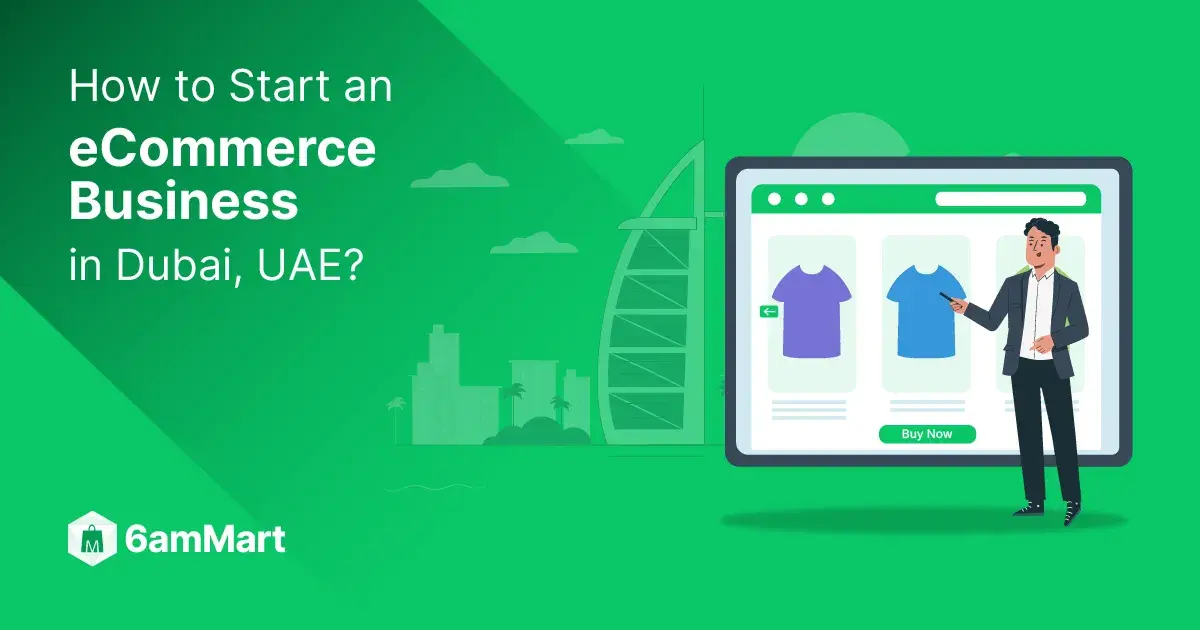What’s the first word that comes to your mind when you hear the word – Dubai?
Opportunities, Luxury, Gold, Sand?
I think the list will go on along with the progress of Dubai.
Everybody knows about the potential that Dubai holds for businesses of any size.
Consumers are more into online shopping. So entrepreneurs are on the hunt for cost-effective and proven ways to start an eCommerce business in Dubai.
If you’re also among them – you have come to the right place. In this detailed guide, I will share the very steps and secrets you need to know to set up an eCommerce Marketplace Business in Dubai.
Let’s get started!
Steps to Start an eCommerce Business in Dubai
Now let’s have a deeper look into the steps that can help you kickstart your eCommerce business in Dubai –
Step 1: Define your business idea
Take a moment to brainstorm your business idea before anything.
Decide on:
✅️ What will you sell?
✅️ Who are your ideal customers?
Having a clear vision will guide your decisions throughout the process.
Step 2: Market Research
Do market research to understand the demand for the product among the customers. Identify if there’s any gap in the market that you can fill with your unique product or service.
Researching competitor trends and customer needs will help you identify a profitable niche for your online store.
Step 3: Choose Your Business Structure
Select the most suitable business structure as per your business plan, long and short-term goals. You can go for – sole proprietorship, partnership, or company. Consider factors like liability, taxation, and ownership while choosing the model.
Step 4: Business Location
It’s important to consider where you will officially set up your shop. Dubai offers two main options:
Mainland Company: You can operate anywhere in the UAE and sell directly to mainland customers. But, you need to have a physical office and the licensing process might be a little more complicated.
Free Zone Company: You can set up your business quickly, and enjoy tax benefits. It often caters to specific industries. For instance, Dubai Internet City is one of the mentionable for e-commerce businesses. However, free zone companies may face limitations in selling directly to customers in the UAE mainland.
Step 5: Business Trade Name Registration
Choose a name that reflects your brand and resonates with your target audience in Dubai. You can typically do it online through government websites or apply in person by visiting offices like government service centers, Tasheel offices, etc.
Here’s what you will need to keep in mind:
- The name should be uniquely yours and not already registered by another business. You will get help through most online registration platforms through a quick check.
- You will need to get approval from the Department of Economic Development and the Ministry of Economy for the trade name and trademark.
- You can not use the names of rulers, government agencies, or the names and logos of government bodies for your eCommerce business in Dubai.
Step 6: Apply for eCommerce Business License
The specific eCommerce license requirements differ slightly depending on whether you choose a mainland company setup or a free zone company. Generally, you’ll need to submit a detailed business plan outlining your online store’s operations, products, and target market.
Here’s a general idea of what you might need to submit:
- Receipt of initial approval and copies of all previously submitted documents ( Business plan, LSA or MOA, Trade name registration approval)
- Copy of the lease contract duly attested
- Approvals from other government entities (if required)
Step 7: Open a corporate bank account
You’ll need a dedicated bank account to manage your business finances. This helps separate your personal and business transactions, making record-keeping easier and looking professional.
Wondering how?
You just need to choose a bank by looking for the features that you need the most. The features or services may include online banking, debit cards, international transfers, etc. Once decided submit the required documents to that respective bank. Done!
Step 8: Registration and Fee Payment
Once your application and documents are approved, it’s time to secure your official business license! Now you will complete the registration and fee payment process.
The specific fees will vary depending on your chosen business structure, location (mainland or free zone), and the type of license you require.
Here’s what you’ll typically need to submit for final registration:
1. Completed application form for registration: Ensure all details are accurate and complete.
2. Board Resolution appointing Manager/Director (notarized and attested): This document formally appoints the individual(s) who will manage your business operations.
3. Power of Attorney given to Manager/Director (notarized and attested): This grants specific legal authority to the appointed manager(s) to act on behalf of the company.
4. Memorandum and Articles of Association (notarized and attested): This document outlines the company’s structure, objectives, and governance rules.
5. Specimen signature of Manager/Director (notarized and attested): This verifies the authorized signatures for official business transactions.
6. Passport-size photos of the Manager/Director: These might be required for identification purposes.
7. Share capital information: Provide details on the company’s share capital structure (relevant for some business structures).
Remember to always check with the relevant authorities for the most up-to-date information on specific fees and required documents.
Step 9: Develop Your eCommerce Platform
At this step you need to choose a user friendly eCommerce platform or a platform builder. It will help you to manage your products, orders, and customers.
While choosing or developing the platform consider factors like
- Ease of use
- Scalability
- Features
- Pricing
You can either do this by building a platform from scratch or going for a market ready solution. Creating a custom-built solution requires a lot of time, effort, and resources. It involves a lot of trial and error, which can be a frustrating and time-consuming process.
On the other hand, using a readymade eCommerce solution is much easier and quicker to launch, allowing you to start running your business right away. This can save you a lot of time and energy that can be better spent on other aspects of your business.
Explore: Multi Vendor eCommerce Marketplace Software Demo
Step 10: Digital Marketing Strategies
Unless you spread the word about your business nobody would know! Digital marketing strategies are essential for your eCommerce success.
For this, you can take advantage of social media platforms like Instagram and Facebook. Make sure to check which platform is mostly used by your target audience.
You can also optimize your website content and product listings with relevant keywords. This will help your eCommerce website to rank higher in search engine results. This will drive organic traffic to your website and increase brand visibility.
Also, other marketing methods like email marketing, PPC, and influencer marketing can be used to spread the word!
License and Document Requirements for eCommerce Businesses in Dubai
Before diving into Dubai’s booming eCommerce market it’s important to gather essential licensing and documents. Understanding the licensing and document requirements is key to a smooth start.
E-commerce License Requirements:
- Mainland Company: You’ll need a trading license specifically for e-commerce activities. This typically involves approval from the Department of Economic Development (DED).
- Free Zone Company: Many free zones in Dubai, like Dubai Internet City (DIC), offer dedicated e-commerce licenses. Approval comes from the relevant free zone authority.
Documents Required for Obtaining an eCommerce License in Dubai:
| Document | Mainland Setup | Free Zone Setup |
| Trade Name Request Application Form | Required | Required |
| Business plan | Required | Required |
| Passport copies ( from all shareholders) | Required | Required |
| Visa copies | Required | Required |
| No Objection Certificate (NOC) | Required | Not applicable ( may require in some cases) |
| Lease agreement | Required | Required |
| Proof of address | Required | Required |
| Memorandum of Association | Required | Required |
| Local Service Agent Agreement | Required | Not applicable |
| Passport-Sized Photos | Required | Required |
| Corporate Bank Account Documents | Required | Required |
| Tenancy contract | Required | Not applicable |
| Power of Attorney | Required | Required |
| Approval Letter from the Department of Economic Development (DED) | Required | Not applicable |
Table: Documents required for eCommerce business license in Dubai
Please Note: This table provides a general overview. Always check with the relevant authorities (DED for mainland or the specific free zone authority) for the latest and most accurate information on licensing requirements and document submissions.
Benefits of starting an e-commerce business in Dubai
Dubai is the future! That’s what so many entrepreneurs think.
And why not? Dubai has made it easier for businesses to set up and run smoothly.
Here are some key benefits that make Dubai an attractive location to launch your online store:
1. Tax-Free Environment: Dubai is a great place for e-commerce businesses as there are no corporate or income taxes, which means higher profits. However, companies should note that a corporate tax of 9% was introduced in June 2023. Freezone companies can still qualify for 100% tax exemption if they are small to medium-sized.
2. Diverse Consumer Base: Dubai is a multicultural city with a diverse population. This presents a great opportunity for businesses looking to expand their market and cater to a variety of preferences and tastes.
3. Strategic Location: Dubai’s position as a global trade hub makes it easy to import products and reach a wider audience across the Middle East and beyond.
4. Tech-Savvy Population: Dubai’s tech-savvy population is comfortable shopping online, making them receptive to e-commerce businesses.
5. Full Ownership: Unlike some other countries, Dubai allows you to have 100% ownership of your e-commerce business as a foreign entrepreneur. This gives you full control over your company’s direction and profits.
6. Innovation and Smart City Initiatives: Dubai is a prime location for innovation, with smart city projects such as “Dubai Internet City” that cultivate a tech-savvy atmosphere. This provides an ideal environment for e-commerce businesses to succeed.
7. No Currency Restrictions: You can conduct business in various currencies without restrictions. This simplifies international trade and makes managing finances easier. No matter where your customers are located, you can streamline operations.
8. Supportive Government: The Dubai government actively encourages e-commerce businesses with simplified licensing procedures and free zone options, making it easier to get your business up and running quickly.
Final Words
Launching your eCommerce business in Dubai offers a world of opportunities. If you are doubtful about the process of how to start an eCommerce business in Dubai – I hope this guide has equipped you with all the essential knowledge.
By following this guide and keeping up with the latest licensing rules and regulations, you can ensure that your eCommerce business runs smoothly.
With this knowledge, you’ll be well-equipped to start and run your business with confidence. Thank you for taking the time to read this guide.
Hope to see you in the next one!
FAQs
How much does it cost to get an e-commerce license in Dubai?
Costs vary depending on your chosen setup and license type. Expect to pay for license issuance fees, administrative charges, and potential notary/attestation fees. It can range between 1,070 AED to 15,000 AED approximately.
What are the different types of e-commerce licenses in Dubai?
There are generally two options: mainland licenses allowing operation anywhere in the UAE, and free zone licenses offering faster setup and tax benefits, but with limitations on mainland sales.
Are there any restrictions on the types of products or services I can sell through my Dubai-based eCommerce business?
Yes, there are some limitations. You can only sell products and services that are legal to trade in the UAE. This means anything requiring special approval needs to be cleared before you can offer it online.
Meet Mehrin! A technical writer with a Computer Science background. She combines her academic knowledge & creativity to transform complex facts into engaging content. With a sharp eye for detail, she keeps readers updated on tech trends. Outside of writing, she’s a visual storyteller, capturing life’s moments through photography.









